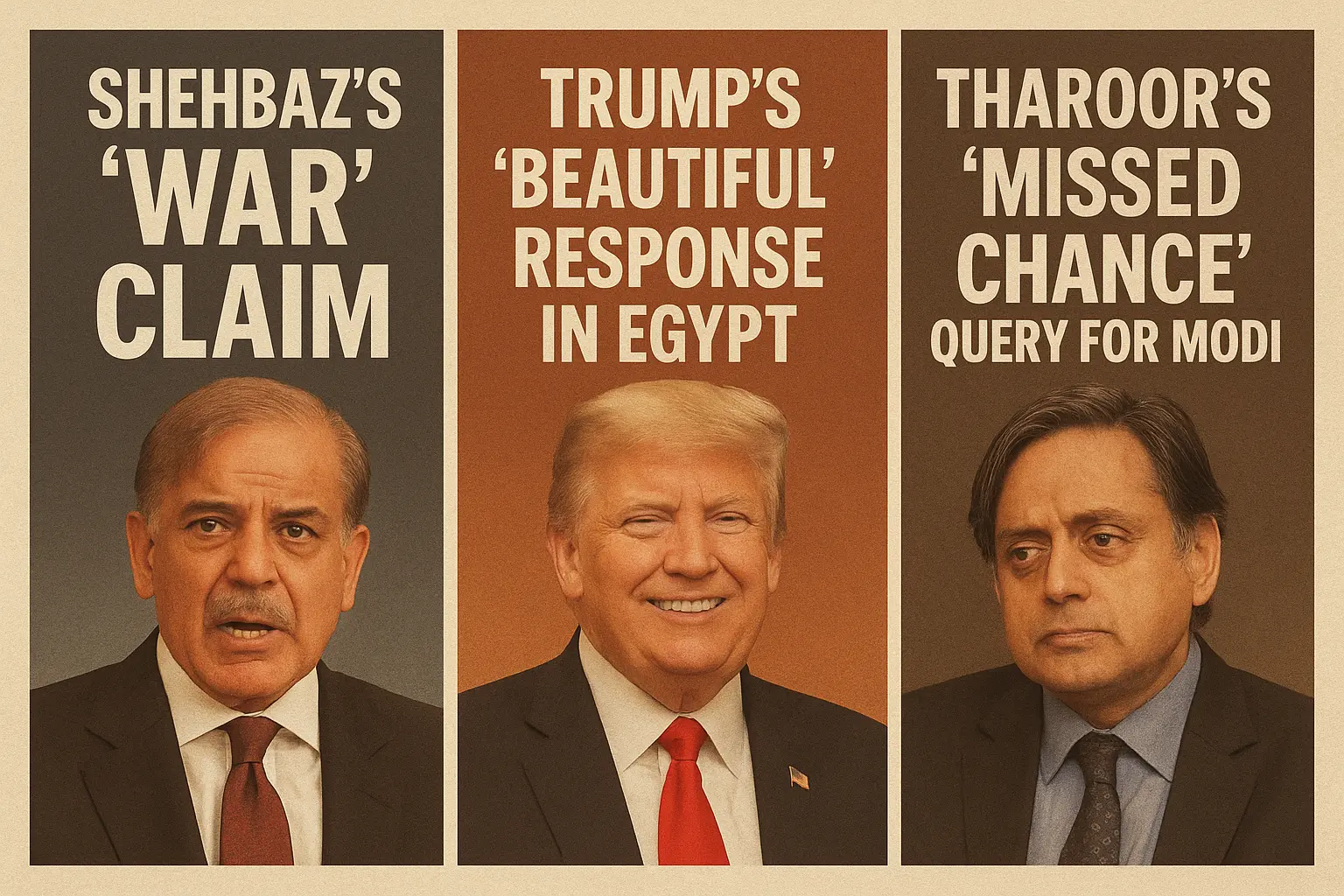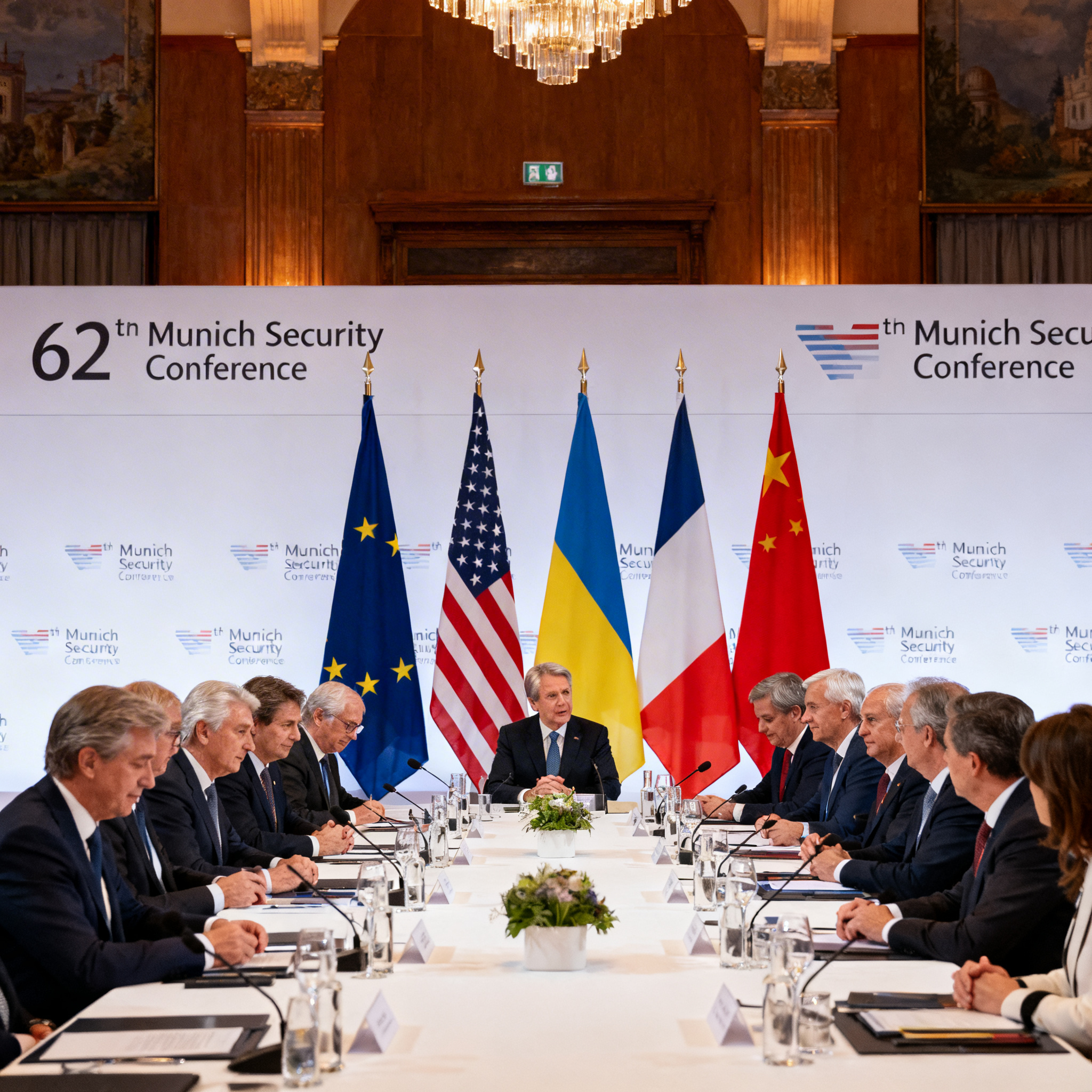Shehbaz’s ‘war’ claim, Trump’s ‘beautiful’ response in Egypt amid Tharoor’s ‘missed chance’ query for Modi

In a single week, the global political stage witnessed three strikingly different tones of leadership. Pakistan’s Prime Minister Shehbaz Sharif invoked the language of war after border tensions with India. Across continents, former U.S. President Donald Trump, attending a peace summit in Egypt, declared the end of conflict with his trademark optimism. Meanwhile, in India, Congress leader Shashi Tharoor questioned Prime Minister Narendra Modi’s absence from that very summit — calling it a missed opportunity.
Together, these moments reveal how political messaging and presence shape international perception as much as policy itself.
Shehbaz Sharif’s ‘War’ Claim — Rhetoric vs. Reality
As India and Pakistan faced renewed border friction, Shehbaz Sharif labeled India’s actions as an “act of war” and praised his armed forces for their “swift and brave response.” He went as far as claiming Pakistan’s forces had downed Indian jets — though India has not verified such reports.
However, in a later statement, Shehbaz admitted that Pakistan was “caught unawares” by India’s BrahMos missile maneuvers — a confession that undercut his earlier war rhetoric.
Analysis:
- Shehbaz’s fiery statements serve political optics more than military strategy.
- “War talk” can unite domestic audiences temporarily, but it also exposes leadership credibility when followed by contradictory admissions.
- The mix of defiance and vulnerability mirrors Pakistan’s long-standing balancing act between bravado and diplomatic caution.
In the digital age, where sound bites spread faster than strategies, Shehbaz’s “war” claim demonstrates how emotional language can both rally and risk a nation’s image.
Trump’s ‘Beautiful’ Response — Peace Through Optics
Thousands of miles away, Donald Trump was in Sharm el-Sheikh, Egypt, co-chairing a Gaza Peace Summit aimed at stabilizing the region after months of violence. In classic Trump style, he declared, “The war is over — and the future will be beautiful.”
He praised the ceasefire deal, met with Egypt’s President Abdel Fattah el-Sisi, and positioned himself as the mediator of a new Middle East reset. Sisi called the moment a “last chance for lasting peace.”
Analysis:
- Trump’s optimism plays well on television and social media. His “beautiful” phrasing reframes war into a story of hope and renewal — a narrative style that helped define his earlier foreign policy image.
- But the true test lies in follow-through: peace summits often sound grand but falter in execution once cameras fade.
- Still, Trump’s presence and tone show how language itself can shape global moods, influencing allies and rivals alike.
In contrast to Shehbaz’s war rhetoric, Trump’s peace vocabulary shows how power can be projected not just through armies — but through attitude.
Tharoor’s Question — Did Modi Miss a Diplomatic Moment?
While global leaders gathered in Egypt, India’s seat at the summit was filled not by Prime Minister Narendra Modi, but by Minister of State Kirti Vardhan Singh.
Congress MP Shashi Tharoor publicly questioned this decision, asking whether India had “missed a chance to assert its growing global role.” His concern wasn’t about the capability of India’s representative — but about optics and influence.
At a table where Pakistan’s Shehbaz Sharif, Egypt’s Sisi, and Trump himself were present, Modi’s absence stood out.
Analysis:
- Global summits are not only about decisions — they’re about presence. Being in the room often translates to being in the conversation.
- Tharoor’s question highlights a subtle but important truth: diplomacy today is part visibility, part vision.
- India’s choice might reflect caution — avoiding entanglement in Middle East tensions — but it also risks signaling disengagement at a time when India aims to project itself as a major voice for peace and stability.
In politics, sometimes not showing up sends as strong a message as any speech.
Connecting the Dots — The Power of Presence and Perception
Across these three stories, a pattern emerges:
- Shehbaz Sharif uses rhetoric to rally.
- Donald Trump uses optimism to persuade.
- Narendra Modi’s absence prompts a debate about representation.
All three reflect how modern leaders manage image, narrative, and influence in the digital era. Words, appearances, and even silences become tools of global politics.
For India, this week’s events offer a reminder — in international diplomacy, symbolism matters as much as substance.



